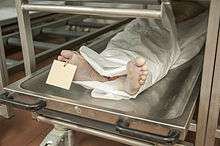Medical jurisprudence


Medical jurisprudence or legal medicine is the branch of science and medicine involving the study and application of scientific and medical knowledge to legal problems, such as inquests, and in the field of law.[1] As modern medicine is a legal creation, regulated by the state, and medicolegal cases involving death, rape, paternity, etc. require a medical practitioner to produce evidence and appear as an expert witness, these two fields have traditionally been interdependent.[2]
Forensic medicine, which includes forensic pathology, is a narrower field that involves collection and analysis of medical evidence (samples) to produce objective information for use in the legal system.[3]
History
Medical jurisprudence had a chair founded at the University of Edinburgh in 1807, first occupied by Andrew Duncan, the younger. It was imposed on the university by the administration of Charles James Fox, and in particular Henry Erskine working with Andrew Duncan, the elder.[4]
Scope
Medical jurisprudence is concerned with a broad range of medical, legal, and ethical issues, as well as human rights and rights of individuals.
Physicians have a duty to act in their patients best interest and can be charged in a court of law if they fail to do so. On the other hand, a physician may be required to act in the interest of third parties if his patient is a danger to others. Failure to do so may lead to legal action against the physician.
States have been known to ask physicians engage in torture of individuals or examine and identify individuals who can endure torture. In such circumstances, physicians must choose whether to disobey the authorities even at the risk of harm to themselves.
Physicians assess injured individuals and the degree of impairment they cause. This allows courts to determine and award damages.
They may also be required to assess the mental status of accused persons and whether they are fit to stand trial. They may also determine whether an individual is of sound mind and capable of getting into a binding contract with another party.
They are also required to perform an autopsy to determine the cause or time of death where this is not clear.
Medical jurisprudence includes:
- questions of the legal and ethical duties of physicians;
- questions affecting the civil
Under the second heading, there are many aspects, including:
- questions of competence or sanity in civil or criminal proceedings;
- questions of competence of minors in matters affecting their own health; and,
- questions of lawful fitness or safety to drive a motor vehicle, pilot an aeroplane, use scuba gear, play certain sports, or to join certain occupations.
Under the third heading, there are also many aspects, including:
- assessment of illness or injuries that may be work-related (see workers' compensation or occupational safety and health) or otherwise compensable;
- assessment of injuries of minors that may relate to neglect or abuse; and,
- certification of death or else the assessment of possible causes of death. This, however, is the more commonly understood, albeit narrow, meaning of forensic medicine.
References
- ↑ Theodric Romeyn Beck and William Dunloop. (1825.) Elements of Medical Jurisprudence, 2 ed., Oxford University Press.
- ↑ James C. Mohr. (1993.) Doctors and the Law: Medical Jurisprudence in Nineteenth-Century America, Oxford University Press, New York City.
- ↑ Alfred Swaine Taylor and Frederick John Smith (ed.). (1920.) Taylor's Principles and Practice of Medical Jurisprudence, 7 ed., Taylor & Francis.
- ↑ White, Brenda M. "Duncan, Andrew (1773–1832)". Oxford Dictionary of National Biography (online ed.). Oxford University Press. doi:10.1093/ref:odnb/8213. (Subscription or UK public library membership required.)